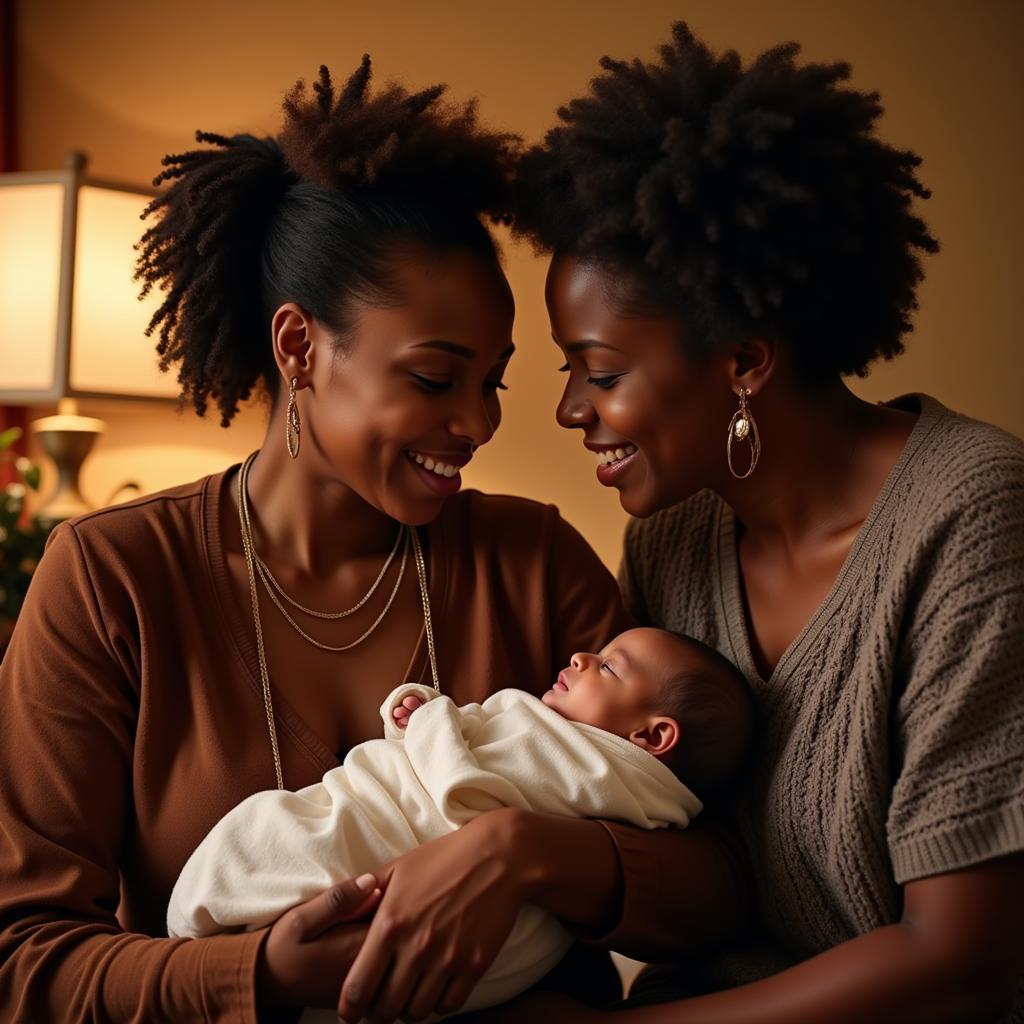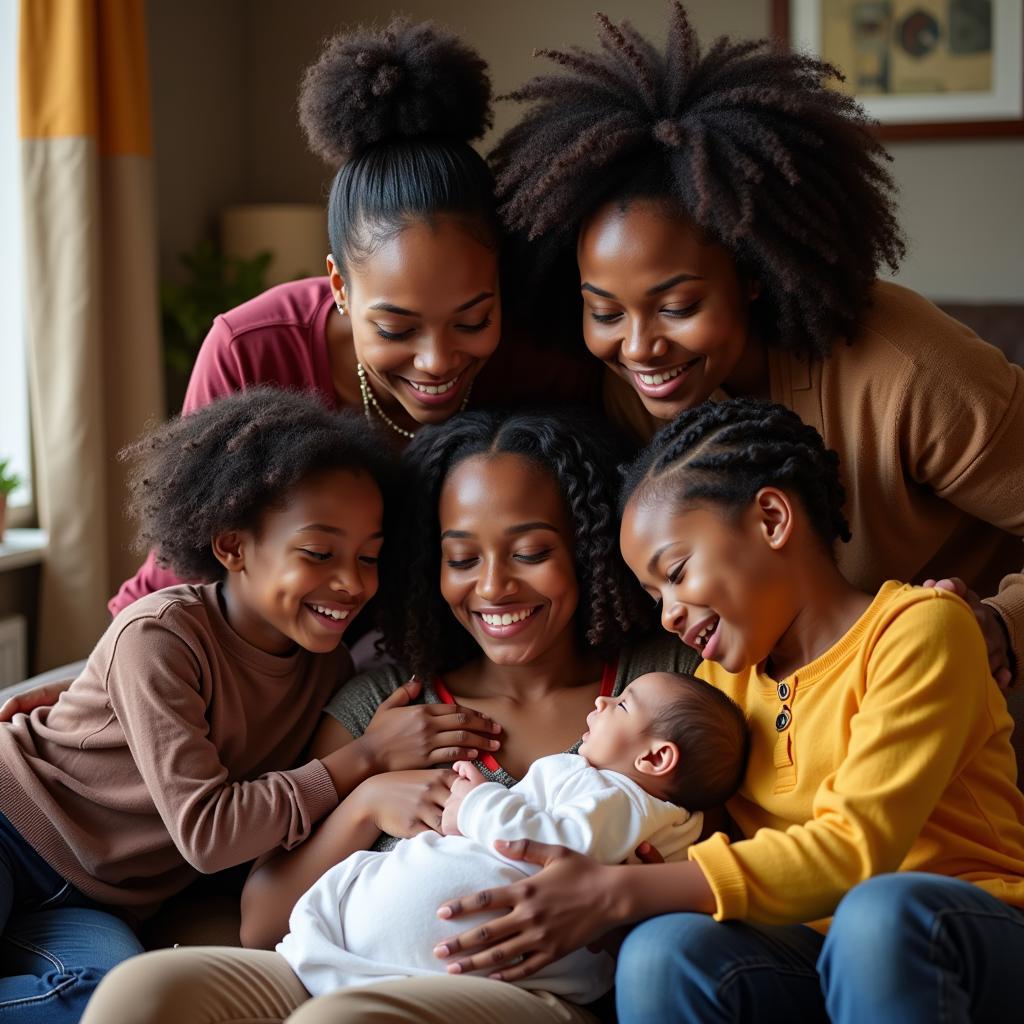African American Childbirth Traditions: A Rich Tapestry of Culture and Care
African American Childbirth Traditions are a blend of ancestral practices, cultural adaptations, and modern healthcare. These traditions reflect a deep connection to heritage and a strong emphasis on community support throughout the pregnancy and postpartum period. This article explores the unique aspects of African American childbirth customs, offering a glimpse into the rich history and evolving practices that shape this important life event.
Honoring Ancestral Practices in Modern Times
Historically, African American childbirth traditions were deeply rooted in West African customs brought over during the transatlantic slave trade. Midwives, often respected elder women within the community, played a crucial role, providing guidance, physical support, and spiritual comfort to expectant mothers. These midwives possessed a wealth of knowledge about herbal remedies, massage techniques, and traditional birthing practices, ensuring a safe and culturally relevant birthing experience. Even today, these practices resonate within many families, emphasizing the importance of emotional and spiritual well-being during childbirth.
Many contemporary African American families are reclaiming these ancestral practices. They are seeking out doulas, particularly those who understand and respect cultural nuances, to provide support and advocacy throughout the birthing process. This resurgence reflects a desire to connect with heritage and create a more empowering and culturally sensitive birthing experience.
It’s important to understand the unique needs and concerns of African American women during pregnancy and childbirth. Factors such as systemic racism and implicit bias in healthcare can contribute to disparities in maternal health outcomes. By acknowledging these challenges and promoting culturally competent care, we can strive to create a more equitable and supportive environment for all expectant mothers.
african american doula near me
What are some common African American childbirth practices?
Several traditional practices have been passed down through generations, often adapted to fit modern contexts. These include using specific herbs for teas and remedies, incorporating spiritual rituals and prayers, and emphasizing community support during the postpartum period. These practices often serve to create a sense of continuity, connecting the birthing experience to a rich cultural lineage.
 African American Mother and Midwife during Childbirth
African American Mother and Midwife during Childbirth
One example is the practice of “laying on of hands,” where family members place their hands on the mother’s belly during labor, offering blessings and strength. This act symbolizes the communal support and shared responsibility in welcoming the new life into the world. Furthermore, many families continue the tradition of postpartum care involving specific dietary guidelines, herbal baths, and massage techniques aimed at restoring the mother’s physical and emotional well-being.
The Importance of Community Support
Community plays a vital role in African American childbirth traditions. Family members, friends, and church communities often rally around the expectant mother, offering practical help, emotional support, and spiritual guidance. This network of care extends beyond the immediate postpartum period, providing ongoing assistance with childcare, household chores, and emotional well-being.
 African American Family Supporting New Mother
African American Family Supporting New Mother
Dr. Anika Johnson, a prominent cultural anthropologist specializing in African American traditions, emphasizes the significance of community: “The village mentality is central to the African American childbirth experience. It’s about shared responsibility, collective wisdom, and providing a web of support that nurtures both the mother and the newborn.”
Addressing Health Disparities in Maternal Care
While celebrating rich traditions, it’s crucial to acknowledge the persistent health disparities faced by African American women. They experience significantly higher rates of maternal mortality and morbidity compared to other racial groups. Factors such as implicit bias in healthcare, limited access to quality prenatal care, and socioeconomic disparities contribute to these inequities.
“We must address these disparities head-on by promoting culturally competent care, advocating for equitable access to healthcare resources, and empowering African American women to make informed decisions about their birthing experience,” asserts Dr. Johnson.
 African American Woman Receiving Prenatal Care
African American Woman Receiving Prenatal Care
Conclusion: Embracing Tradition and Advocating for Change
African American childbirth traditions offer a powerful testament to the resilience, strength, and cultural richness of a community. By understanding and respecting these traditions, we can foster a more inclusive and supportive environment for all expectant mothers. Simultaneously, addressing the health disparities that disproportionately affect African American women is paramount. By embracing tradition and advocating for change, we can work towards ensuring a healthy and empowering childbirth experience for every woman.
FAQs
- What is the role of a doula in African American childbirth?
- Are there specific dietary recommendations during postpartum care in African American traditions?
- How can I find culturally competent healthcare providers?
- What resources are available to address health disparities in maternal care?
- How can I learn more about my family’s childbirth traditions?
- What are some traditional herbal remedies used during pregnancy and postpartum in African American culture?
- How can communities better support African American mothers during and after childbirth?
Need help finding an African American doula near you? Check out african american doula near me for more information.
We also encourage you to explore our other articles on related topics, such as the history of midwifery in African American communities and the impact of cultural beliefs on postpartum practices.
When you need support, contact us 24/7: Phone: +255768904061, Email: [email protected], or visit us at Mbarali DC Mawindi, Kangaga, Tanzania.